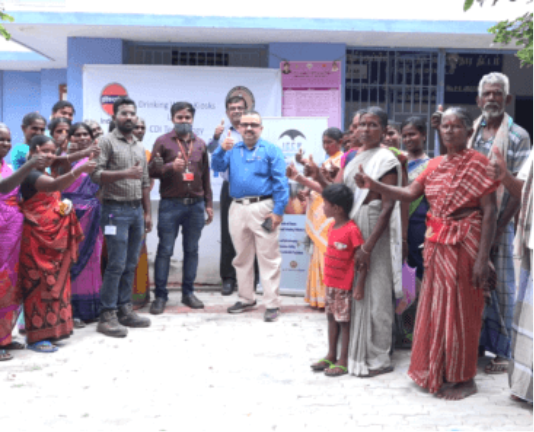Clean water matters – IEC at IOCL units in Ramanathapuram and Tuticorin
65- year- old Parameshwari, a housewife, at Veppalodai village in Tuticorin district, used to walk many miles every day to fetch drinking water. However, for Parameshwari and her ilk, things are going to change for good. The new CDI units that will soon get commissioned in her village will provide clean drinking water to the village residents. Like Parameswhari, many old and young ladies who participated in the recent IEC activities conducted by ICCW along with IOCL and InnoDI Technologies shared the daily struggle they faced to fetch clean drinking water. ICCW, along with IOCL and InnoDi technologies has commissioned three drinking water kiosks at Veppalodai, Vedapatti in Tuticorin district and Vagaikulam in Ramanathapuram district.
CDI UNITS
The Kiosks are part of Corporate Social Responsibility (CSR) projects conducted by the Indian Oil Corporation (IOCL) Pipelines Division. Capacitive Deionization (CDI) is an emerging technology that saves 90% of reject water when compared to the prevalent Reverse Osmosis (RO) technology. While RO is currently the only technology for high salinity water, CDI offers a sustainable alternative for Total Dissolved Solids (TDS) less than 200 mg/litre. Besides saving on reject water, CDI all retains essential minerals such as calcium and magnesium, consumes less energy and is low on operating and maintenance costs. All the three CDI units installed are Solar Energy enabled for uninterrupted supply of clean and healthy water to villagers.
As part of the project, ICCW conducted IEC activities at the sites to create awareness among the villagers on the benefits of CDI, the need for water conservation and above all to take responsibility for the units’ operation and maintenance. The units come with smart card operation through which villagers get their required quantity of water for a fee. The fee will be decided by the community and will take care of the O&M and retain a surplus for contingencies. C Sripati, Expert Engineer, ICCW explained the different contaminants that could be present in groundwater and how conventional methods of treatment may not remove all contaminants, which could lead to long-term health impacts. ICCW plans to monitor the social impact on the community post the installation of these units.

